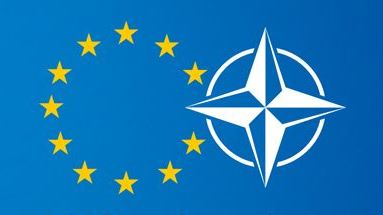
I have been preaching for well over a decade now that America needs to realize that it's most productive allies going forward, when it comes to security affairs, are going to be different from those upon whom it relied in the past.
It's a simple logic that fits global trends: Europe was incentivized big-time before, it's far less so now. America feels a different responsibility on a global scale. China and India rise, their global interests expand, and they display more and more interest and capacity to defend those interests.
So not a hard leap: you work with those most similarly incentivized in the era that you're in right now. You don't hold to nostalgia. You want allies with big (and growing) militaries), growing interests, and a clear willingness to go place and kill people to protect those interests. Crudely put, but there it is.
We are currently in an age of transition from a familiarity and comfort-zone with Europe to one in which we are inevitably drawn into cooperation with India and China to manage this world from a security perspective.
And yet, there is a part of me that says, what matters most going forward is who gets to the shared future in the best shape. And that means, who processes (as I've said in the brief for a while now) the widespread populist anger and pursues a sufficiently progressive agenda to clean things up and get their countries in shape for the economic competitions still to come. By that last part, I mean, we see a global middle class rise now, and we face an era of extreme technological change as a result. Why? The compelling global need to disconnect standard of living from consumption - plain and simple.
For now, I like the path America is going to have to go down regarding painful reforms and improvements better than I like those of India or China (also a staple of my brief). We've engaged in such progressive eras before and we're well suited to that task. We simply lack the political leadership now.
And here's the rub that creates the doubt.
If we run off too seriously in our strategic "pivot," I fear we engage in the usual escapism ("Look Ma! I'm fixing the future!") instead of looking within and making the necessary changes happen.
Europe faces many of the same advanced challenges. We unconsciously model ourselves on them, and they on us, far more than either cares to admit. Read the Economist if you don't believe me.
So my concern is this: are we missing the great opportunity for co-evolutionary dynamics if America turns too swiftly and deterministically on this pivot?
Obama is an arrogant man and an even more arrogant president. Not as bad as Bush, but still.
I fear this strategic "pivot" is one of the most poorly considered shifts the US has ever made. I usually cite the foolishness of picking fights with one's banker, and there are many more, but this time I think we're losing our center of gravity some inside globalization.
I also fear we're missing a chance to reform ourselves as needed. We'll find no answers in China and India on this score. And - again - the sense of geo-political escapism is palpable regarding the Arab Spring, Africa's churn, our need to integrate more with LATAM.
Don't get me wrong: I don't see scarier worlds out there that need more US military operations. I see a world of small threats, small wars and small - networked - efforts.
And then I see a president with this grand notion of boxing China in - no matter what fine words he's using - and I see a narrow vision arrogantly pursued.